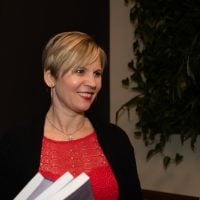View this post on Instagram
I was lying facedown in the hotel bed.
My hand was in a fist; my thumb knuckle pressed between my ribs just beside my heart to try to ease the sharp pain.
My husband and I were on a trip through Paris and Amsterdam, while our daughters, ages 15 and 13, were taking their own international trips, separate from us—and even from each other.
My family had never before (and has not since) been this physically far apart from each other.
I was thrilled for my daughters to be taking this once-in-a-lifetime opportunity to travel abroad with their peers. I respected the “CQ,” or cultural intelligence, my daughters would gain.
But I missed them so much it hurt my heart. Literally. It was as if, in an effort to keep my family together energetically since we couldn’t be together physically, my heart was stretching itself to try to hold them and keep them safe.
But, one daughter was in Rome, the other in Nice, and my husband and I were in Amsterdam. Our home, where we’d left our pets, was Minnesota. No amount of stretching could hold it all together. Yet, my heart tried so damn hard to do just that.
By day, I soothed myself with Facebook pictures showing my smiling, adventurous daughters while spraying myself with sweet, flowery French perfume that seemed to calm my mind. I tried as best as I could to enjoy myself—after all, this was a once-in-a-lifetime trip for my husband and me, too.
But night after night, the pain rose sharp right along my rib cage, and I jammed my fist into my chest.
Costochondritis is what my doctor called my condition. Heartsickness is what I called it.
There is no over-the-counter remedy that helps ease heartsickness, nor is there a medication to cure it. Positive self-talk didn’t go very far, and trying to “forget about it” wasn’t a possibility. The only thing that cured my heartsickness was the reunion with my children and my home, after which the pains instantly abated.
A year later, I planned and ventured on a personal pilgrimage to Myanmar (formerly Burma) for three weeks. I was proud of myself for doing something I was sure would be life-changing and curious as to how I would do exploring by myself.
Since I had a jam-packed itinerary throughout the trip, I intentionally scheduled four inactive days at the beach to end the trip. To my planning self, this would be much-needed time at the end to rest and reflect.
Big mistake.
Those final days, I felt homesickness as I have never felt it before. I longed not only for my own bed but for the particular weight of my comforter on my body. I wanted to run my hands along my bookshelves and dig through my kitchen cabinets for my favorite spices. I even craved the sound of traffic driving past my house, something that generally annoys me.
Given the 12-hour time difference, talking to my family was tricky and no always possible. After one day of resting by the Bay of Bengal, I started wishing time away. After day two, I was adding up the hours remaining. By the time I embarked on my final plane ride home, my limbs were limp from the mental exhaustion of being in one place but so desperately wanting to be in another.
You know those scenes in movies where someone arrives home from the airport and jumps into the arms of the person waiting for them? That was me when I finally landed back in Minnesota.
Human life brings with it all kinds of pains, but heartsickness and homesickness are two of the most painful, in my experience.
We know we are connected, viscerally, to those we love. But until I was separated by miles and time differences, I don’t think I realized how real these energy cords are. And how, like any real cord, they strain when stretched.
Until I felt the stress on my heart to hold everyone together, I never realized that I could often go about my daily life with ease because of the proximity of my family and of home.
As an introvert, I believed I could be alone for a long time before needing people around me. I’d gone on many weekend-long (and even week-long) trips by myself before and never experienced homesickness, so I had assumed that I probably never would. But these experiences proved otherwise.
As someone who considers myself independent and values independence, I was amazed to discover how interdependent I really am—how much of my life is programmed around and, yes, dependent upon others.
And as someone who has often claimed to not be sentimental, I was taken aback by the ache to be back around the things of my life—the gifted coffee cups with clever sayings meant just for me, my soft, Vera Bradley blanket, the scent of freshly-washed clothes in my own detergent.
When I went to Myanmar, I did so from a place of discontent and confusion in my life and my work. This pilgrimage, I’d hoped, would help me gain clarity about my direction in life.
Instead, the pilgrimage taught me the value of home.
I’m a completely different person today than I was before I took my trip to Myanmar. It’s not because I had some spiritual epiphany or awakening, but because I discovered a great truth:
There is nothing that matters more in this life than our relationships with each other.
Not purpose, not finding balance, not owning someone on social media, not writing a winning article.
Just this matters: the love and support we have with and for each other and the simple, comforting—even repetitive—pleasures and routines of home.
I traveled (and encouraged my daughters’ travels) for the value of what we might gain through these worldly experiences.
Instead, I learned to better value what I already have.











Read 27 comments and reply